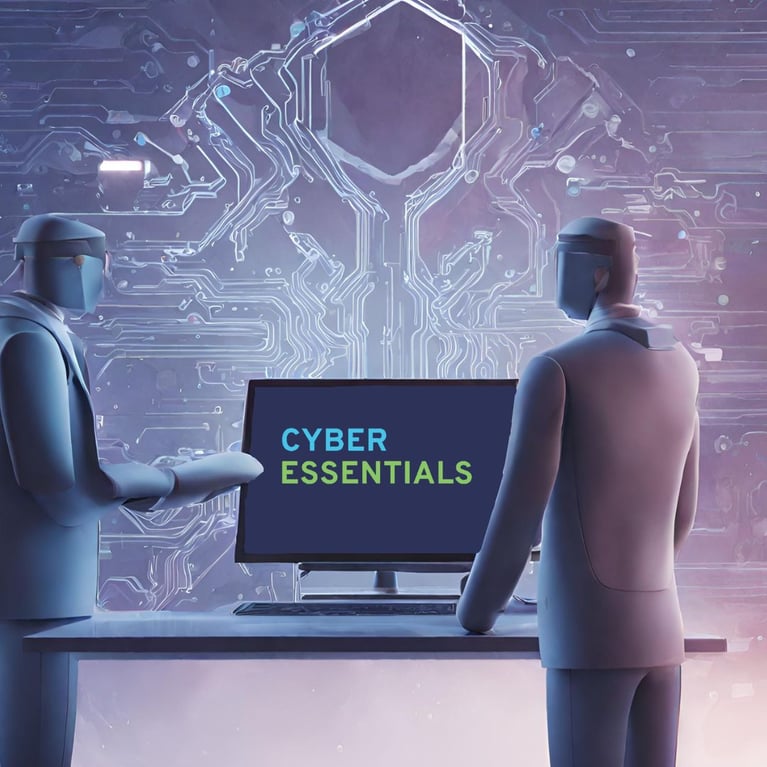Introduction
Get ready to revolutionise your business with 5G technology! In this article, we'll explore how 5G is set to reshape how companies operate and thrive in the digital age. We'll cover everything from understanding the basics of 5G technology to its key business advantages. Discover how 5G differs from previous generations, its benefits to businesses, and essential tips on preparing your business for a 5G future. Don't miss out on leveraging the power of 5G technology to take your business to new heights.
Introduction to 5G Technology
In today's fast-paced, interconnected world, staying connected and having access to high-speed internet is no longer a luxury but a necessity. The evolution of mobile networks has played a significant role in fulfilling this need, and the latest advancement in this realm is 5G technology. 5G, or fifth-generation technology, is poised to revolutionise communication, work, and life. It promises lightning-fast speeds, ultra-low latency, and excellent reliability, opening up a world of possibilities for businesses across various industries.
Definition of 5G Technology
5G technology is the fifth generation of wireless internet connectivity designed to deliver breakneck speeds, support more devices, and enable seamless connectivity. It leverages advanced technologies, including millimetre waves, massive MIMO (multiple-input, multiple-output), beamforming, and small cells, to provide a superior wireless experience. With its enhanced capabilities, 5G is set to power various applications, from smart cities and autonomous vehicles to virtual reality and telemedicine.
Evolution of Mobile Networks
To truly appreciate the significance of 5G technology, it's essential to understand its evolutionary journey. The first generation (1G) of mobile networks introduced analogue voice communication, while the second generation (2G) brought digital voice and introduced text messaging. The third generation (3G) enabled mobile internet and expanded the possibilities for communication. The fourth generation (4G) further enhanced internet speeds, paving the way for mobile video streaming and the widespread adoption of smartphones. And now, 5G is set to take us to a new level of connectivity and innovation.
Key Features of 5G
Its transformative set of crucial features sets 5G apart from its predecessors. Firstly, 5G offers significantly higher speeds, allowing faster downloads, smoother streaming, and near-instantaneous data transfer. This speed boost will unlock countless opportunities for businesses that rely on high-bandwidth applications, such as video conferencing, cloud computing, and data-intensive operations.
Secondly, 5G boasts greater capacity, meaning it can support more devices simultaneously without compromising performance. This is particularly important as more and more devices become connected in our increasingly digitised world. With 5G, businesses can confidently deploy IoT devices, intelligent sensors, and other connected technologies without worrying about network congestion.
Another vital aspect of 5G technology is its lower latency and enhanced reliability. Latency refers to the time it takes for data to travel between devices and the network. With 5G's ultra-low latency, businesses can enjoy real-time communication and near-instantaneous responses, enabling seamless interactions and enhancing productivity. Additionally, the improved reliability ensures a stable network connection, reducing downtime and potential disruptions.
Importance of 5G for Businesses
As businesses continue to adapt to the demands of the digital age, the importance of 5G technology becomes increasingly apparent. 5G has the potential to transform industries across the board, enabling companies to streamline operations, unlock new opportunities, and drive innovation. Here are some key reasons why 5G is essential for businesses:
-
Faster and More Efficient Operations: With 5G's high-speed connectivity and low latency, businesses can optimize their operations and increase efficiency. Tasks that previously took minutes can now be completed in seconds, allowing employees to accomplish more in less time.
-
Improved Connectivity and Communication: 5G's enhanced connectivity ensures that businesses can stay connected with their employees, customers, and partners wherever they are. This seamless communication is vital for collaboration, customer service, and remote work scenarios.
-
Enhanced IoT and Smart Devices: The Internet of Things (IoT) has already revolutionised various industries, and 5G technology will accelerate its growth. With 5G, businesses can harness the full potential of IoT devices and intelligent sensors, enabling real-time data collection, analysis, and automation.
-
Support for Remote Working and Virtual Meetings: In today's rapidly changing work environment, remote work and virtual meetings have become the norm. 5G provides the necessary infrastructure for smooth video conferencing, remote collaboration, and cloud-based applications, ensuring employees can work efficiently from anywhere.
-
Opportunities for Industry 4.0 and Automation: Industry 4.0, also known as the fourth industrial revolution, is characterised by integrating digital technologies into physical industries. 5G technology forms a crucial foundation for implementing automation, robotics, and artificial intelligence, paving the way for increased productivity and cost savings.
-
Real-time Analytics and Data Processing: With 5G's high-speed connectivity, businesses can leverage real-time data analytics and processing. This capability enables timely insights, faster decision-making, and actionable intelligence, leading to a competitive advantage in today's data-driven landscape.
-
Improved Customer Experience: 5G opens up new possibilities for delivering superior customer experiences. Businesses can leverage augmented reality (AR) and virtual reality (VR) applications to enhance product demonstrations, create immersive experiences, and improve customer engagement.
-
Driving Innovation and New Business Models: The arrival of 5G technology will inevitably lead to new business models and innovative solutions. By leveraging 5G capabilities, businesses can uncover untapped opportunities, develop cutting-edge products and services, and stay ahead of the competition.
With a clear understanding of the importance of 5G technology for businesses, it becomes crucial for organizations to prepare themselves for a 5G future.
Preparing Your Business for a 5G Future
Evaluating Business Needs and Objectives
Before diving into the world of 5G, businesses need to evaluate their specific needs and objectives. This involves identifying the pain points that can be addressed by leveraging 5G technology, understanding the potential use cases, and aligning the business's goals with the capabilities of 5G. This evaluation will ensure that companies invest their time and resources in the areas that can bring the most significant improvements.
Understanding the Potential Applications of 5G
To fully harness the power of 5G, businesses must comprehensively understand its potential applications. This involves exploring various industries and sectors to identify how 5G technology can transform operations, improve efficiency, and create new opportunities. Whether it's healthcare, manufacturing, retail, or transportation, 5G has the potential to unlock innovative solutions and drive digital transformation.
Assessing Infrastructure Requirements
Implementing 5G technology requires evaluating the existing infrastructure and identifying gaps or limitations. This assessment involves understanding the network requirements, including coverage, bandwidth, and latency, and determining if any upgrades or modifications are necessary. Businesses may need to work closely with network providers to ensure their infrastructure can support the demands of 5G technology.
Collaborating with Network Providers
Building a successful 5G strategy often involves collaborating with network providers. These providers have the expertise and resources to deliver high-quality 5G connectivity and can offer valuable insights into the implementation process. By partnering with the right network provider, businesses can access the necessary infrastructure, support, and guidance to ensure a smooth transition to 5G.
Building a Scalable and Secure Network
5G technology brings many benefits, but it also introduces new challenges regarding network scalability and security. Businesses must ensure their networks can scale to accommodate the increased connectivity and data transfer that 5G enables. Additionally, robust security measures and protocols must be implemented to protect sensitive data and safeguard against cyber threats.
Investing in Hardware and Devices
To fully leverage the capabilities of 5G, businesses may need to invest in new hardware and devices. This can include upgrading existing infrastructure, such as routers and switches, to ensure compatibility with 5G networks. Additionally, investing in devices that can take advantage of 5G's high speeds and low latency, such as smartphones, tablets, and IoT devices, will enable businesses to harness the power of 5G technology fully.
Training and Up-skilling Employees
Implementing 5G technology requires more than just the proper infrastructure and devices; it also involves training and up-skilling employees to leverage the new capabilities. Employees need to be familiar with the features and potential applications of 5G and the tools and platforms that can enhance their productivity and efficiency. Investing in training programs and workshops will ensure the workforce is equipped with the necessary skills to embrace the 5G future.
Developing a 5G Strategy and Roadmap
A well-defined strategy and roadmap are crucial for successfully implementing and adopting 5G technology. Businesses should develop a comprehensive plan outlining the goals, timelines, and milestones associated with their 5G journey. This roadmap will serve as a guide, facilitating the smooth transition to 5G, ensuring all stakeholders are aligned, and working towards a common objective.
Considering Regulatory and Security Implications
As with any new technology, 5G brings regulatory and security implications that businesses must consider. It's essential to stay current with the latest regulations and compliance requirements related to 5G implementation. Additionally, robust security measures must be implemented to protect sensitive data and mitigate the risks associated with increased connectivity. Collaborating with security experts and focusing on privacy and data protection will help businesses navigate these challenges.
5G Technology for Businesses
Enhanced Mobile Internet Connectivity
One of the most apparent benefits of 5G for businesses is its enhanced mobile internet connectivity. With 5G, businesses can enjoy faster download and upload speeds, making it easier and quicker to access and transfer large files while on the go. This is especially valuable for industries that rely heavily on mobile connectivity, such as sales teams, field technicians, and remote workers.
IoT and Smart Cities
The Internet of Things (IoT) has been hailed as a game-changer for businesses, and 5G is set to take IoT to new heights. With its high capacity and low latency, 5G can seamlessly connect and manage many IoT devices. This opens up opportunities for businesses to leverage IoT for various applications, including smart cities, smart homes, industrial automation, and asset tracking. With 5G, companies can gather real-time data, optimize processes, and improve efficiency.
Cloud Computing and Edge Computing
Cloud computing has become fundamental to many businesses, enabling seamless collaboration, data storage, and software-as-a-service solutions. With 5G, cloud computing capabilities can be significantly enhanced, allowing faster access to cloud-based resources and applications. Additionally, 5G enables edge computing, which brings data processing closer to the source, reducing latency and enabling real-time decision-making. This is particularly useful for applications that require low latency, such as autonomous vehicles and real-time analytics.
Augmented Reality (AR) and Virtual Reality (VR)
Augmented reality (AR) and virtual reality (VR) technologies hold immense business potential, from immersive training experiences to virtual product demonstrations. 5G's high speeds and low latency are critical for delivering seamless AR and VR experiences, allowing businesses to leverage these technologies to enhance customer engagement, improve training programs, and drive innovation.
Artificial Intelligence (AI) and Machine Learning
Artificial intelligence (AI) and machine learning (ML) technologies are transforming various industries, from healthcare and finance to manufacturing and customer service. 5G's high-speed connectivity and low latency facilitate the transfer of large amounts of data necessary for AI and ML algorithms. With 5G, businesses can leverage AI and ML to automate processes, gain insights from big data, and deliver personalised experiences to customers.
Autonomous Vehicles and Smart Transportation
Autonomous vehicles, drones, and intelligent transportation are no more extended concepts confined to science fiction. With 5G, these technologies can become a reality. 5G's ultra-low latency enables real-time communication between vehicles and infrastructure, ensuring safe and efficient transportation. Businesses in the logistics, transportation, and automotive industries can leverage 5G to optimize fleet management, reduce congestion, and enhance overall efficiency.
Healthcare and Telemedicine
The healthcare industry benefits significantly from the capabilities of 5G technology. With 5G, telemedicine and remote healthcare services can be significantly enhanced, providing real-time video consultations, remote monitoring, and seamless data transfer between healthcare providers and patients. Additionally, 5G enables the IoT to revolutionise healthcare with connected devices, wearables, and remote monitoring systems, optimising patient care and improving outcomes.
Retail and E-commerce
5G technology offers immense potential for the retail and e-commerce industries. With its high-speed connectivity, businesses can provide immersive shopping experiences, leveraging AR and VR technologies to showcase products and create virtual stores. Additionally, 5G enables real-time inventory management, optimised supply chain processes, and personalised customer experiences, ultimately driving sales and increasing customer loyalty.
Manufacturing and Industrial Automation
The manufacturing industry has been at the forefront of digital transformation, with technologies like the Industrial Internet of Things (IIoT) and automation revolutionising operations. 5G takes industrial automation to the next level, enabling real-time communication between machines, sensors, and robots. This facilitates remote monitoring and control, predictive maintenance, and optimised production processes, leading to increased productivity and reduced downtime.
Financial Services and Fintech
The financial services industry relies heavily on connectivity, speed, and security. 5G can significantly enhance these aspects, enabling faster and more secure transactions, real-time data analysis, and personalised financial services. Additionally, 5G's low latency is critical for high-frequency trading and algorithmic decision-making, allowing financial institutions to stay ahead in the fast-paced world of fintech.
In conclusion, 5G technology can potentially revolutionise businesses across various industries. Whether it's faster and more efficient operations, improved connectivity and communication, enhanced IoT applications, or the ability to leverage emerging technologies like AR, VR, and AI, 5G is a game-changer. However, to fully harness the power of 5G, businesses need to evaluate their needs, collaborate with network providers, assess infrastructure requirements, and develop a comprehensive strategy. By embracing the 5G revolution, companies can stay ahead of the curve, drive innovation, and unlock new opportunities for growth and success.
Final Thoughts
With a deep understanding of the telecoms industry, Inflection Point provides tailored solutions, ensuring businesses are ready for 5G and positioned to thrive in their wake.
Inflection Point's seasoned team is dedicated to helping businesses harness the full potential of 5G technology. From in-depth network assessments to strategic consultations, Inflection Point commits to ensuring its partners are 5G-equipped and primed to leverage all this technology's advantages.
Choosing Inflection Point as a partner means aligning with a trusted brand that understands the nuances of the digital age and is unwavering in its commitment to its success. As we stand on the brink of this technological revolution, Inflection Point emerges as the go-to brand for businesses looking to harness the transformative power of 5G and achieve unparalleled growth and success."
Recent Posts
-
 Top 10 Winter Tech Tips: Protecting Your Devices and Data in the Cold
Top 10 Winter Tech Tips: Protecting Your Devices and Data in the Cold -
 Navigating the World of Compliance: GDPR, Cyber Essentials, and Beyond
Navigating the World of Compliance: GDPR, Cyber Essentials, and Beyond -
 DNSFilter: Revolutionising Cybersecurity for Modern Businesses
DNSFilter: Revolutionising Cybersecurity for Modern Businesses -
 Top 10 Festive Season Scams: Safeguarding Your Business Against Seasonal Cyber Threats
Top 10 Festive Season Scams: Safeguarding Your Business Against Seasonal Cyber Threats -
 Embracing Next-Generation Cybersecurity with SentinelOne: A Deep Dive for Modern Businesses
Embracing Next-Generation Cybersecurity with SentinelOne: A Deep Dive for Modern Businesses
